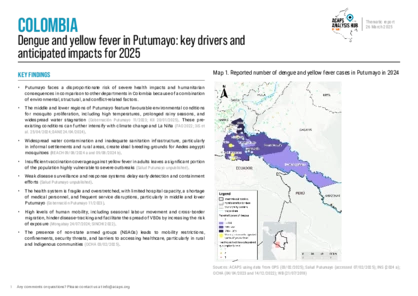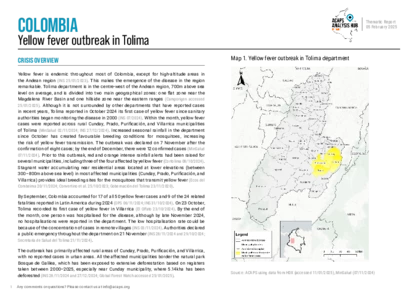Latest updates on country situation
03 February 2026
Heavy rains since mid-January 2026 have triggered severe flooding, landslides, and river overflows across several municipalities of Córdoba and Sucre departments. The crisis escalated sharply on 1 February when the Amansa Guapo Stream overflowed in Coveñas (Sucre), affecting around 15,000 people, while floods in Córdoba have affected an estimated 13,000 people since mid-January. Damage has been reported to crops, public infrastructure, homes, schools, health facilities, and essential services, such as electricity, water, and sanitation. The authorities in Córdoba have declared a public emergency and requested national aid, while Sucre authorities have closed all public beaches and suspended maritime transportation. Needs assessments continue, but based on previous episodes, most urgent needs for the affected people are likely to include shelter, emergency food kits, and WASH services. (El Tiempo 02/02/2026, El Tiempo 02/02/2026, Caracol Radio 02/02/2026)
01 December 2025
From January–October 2025, more than one million people in Colombia were affected by confinement – a situation in which entire communities are forcibly prevented from leaving their homes or towns because of threats, risk of targeted attacks, or territorial control imposed by non-state armed groups. This figure is three times higher than the total number of people affected in 2024. By October, the western departments of Cauca, Chocó, and Valle del Cauca, along the Pacific coast, and the central department of Bolívar had reported the largest numbers of people affected. The increase is primarily driven by intensified clashes, armed shutdowns ('paros armados'), and the growing use of improvised explosive devices and drones by non-state armed groups, particularly in Chocó and Bolívar. Information on the specific needs of those affected remains limited, but the main humanitarian needs are likely to include access to food, healthcare, and protection services. (OCHA 26/11/2025, OCHA accessed 01/12/2025, El Espectador 21/11/2025)
06 October 2025
Since September 2025, armed confrontations between non-state armed groups in Dibulla municipality of La Guajira department have confined around 1,500 people. Educational activities were suspended for two weeks as a result. Although classes have resumed since then, persistent fear and uneven attendance continue to disrupt learning, while a potential rise in school dropouts elevates the risk of children and adolescents being recruited or exploited by armed groups. The confinement has also restricted the community’s access to fishing areas and agricultural plots, threatening primary livelihoods. La Guajira’s existing vulnerabilities, including poor access to clean water, inadequate sanitation infrastructure, and limited hygiene education, especially among Indigenous and rural populations, further amplify the impact of the current crisis. While specific urgent needs for those confined have not yet been reported, evidence from similar situations across Colombia points to critical priorities including food, protection, livelihoods, and WASH assistance. (OCHA 03/10/202, AAH accessed 07/10/2025)
08 September 2025
In early September 2025, 25 of the 29 municipalities in Meta, central Colombia, declared a state of emergency following floods and landslides that affected over 108,000 people. The Ariari, Duda, Guamal, and Meta rivers overflowed, while landslides damaged key transport routes, including the main road linking Meta to northern Colombia. Several alternative roads connecting Villavicencio, the capital, with the rest of the region are also damaged, making movement difficult. Agricultural losses are extensive, with hectares of crops and livestock pastures submerged. Damage to health and education facilities further restricts access to services. The affected population faces a heightened risk of waterborne diseases and other health outbreaks because of unsafe water, adding to current alerts for diseases such as yellow fever, dengue, and chickenpox. Across Colombia, above-average rainfall is stretching national and international response capacities, leaving affected people in Meta with urgent humanitarian needs for food, shelter, WASH, and healthcare. (OCHA 05/09/2025, Radio Nacional 07/07/2025, OCHA et al. 29/07/2025)
19 August 2025
In the first half of 2025, armed conflict affected 1.4 million people in Colombia, four times more than in the same period in 2024. The hardest-hit areas were on the Pacific Coast (Cauca, Chocó, and Valle del Cauca) and near the Amazon Rainforest (Guaviare). This increase heightens protection risks, with forced displacement and mass confinement still the primary risks affecting people. (OCHA 05/08/2025, OCHA et al. 29/07/2025, ABColombia 13/08/2025)
01 July 2025
Between January–May 2025, flooding from river overflow and heavy downpour during the first rainy season affected nearly 400,000 people. In May alone, the floods affected 143,000 people across the country. Among the hardest hit were the communities in La Mojana, a subregion of northern Colombia at the intersection of the Cauca and Magdalena Rivers – two of the largest in Colombia. An estimated 60,000 more people, besides the 80,000 identified as needing assistance in April, currently require humanitarian aid. This mirrors the situation during the first half of 2024 when flooding affected 166,000 people. Some of those affected in La Mojana had already undergone forced displacement or confinement because of violence by non-state armed groups. The heavy rains destroyed public roads, bridges, schools, health centres, and crops across the country, significantly affecting livelihoods. Affected people require humanitarian assistance in food, healthcare, WASH services, and temporary shelter. (OCHA 30/06/2025, OCHA 25/06/2025, OCHA 19/06/2025)
20 May 2025
In the first quarter of 2025, the number of people that armed conflict and violence affected in Colombia (748,000) was four times higher than in the same period in 2024. The primary humanitarian consequences included forced displacement, confinement, and movement restrictions. In Cauca and Chocó departments, located in the Pacific region of western Colombia, non-state armed group (NSAG) sieges and attacks have put nearly 40,200 people under confinement. This is the largest number of any department in the country. The number of displaced people in Catatumbo subregion, Norte de Santander department, also increased by 20% during the first three months of 2025, reaching 58,032, because of fighting between NSAGs. Insecurity significantly limits access to humanitarian aid for affected people in a context where humanitarian organisations are experiencing increasing operational constraints. The people affected require access to shelter, food, and protection services. (OCHA 16/05/2025, OCHA Accessed 20/05/2025, ACLED Accessed 20/05/2025)
current crises
in
Colombia
These crises have been identified through the INFORM Severity Index, a tool for measuring and comparing the severity of humanitarian crises globally.
COL004 - Multiple Crises
Last updated 31/01/2026
Drivers
Conflict/ Violence
Drought/drier conditions
International Displacement
Floods
Crisis level
Country
Severity level
4 High
Access constraints
3.0
COL001 - Conflict and Climatic Shocks
Last updated 31/01/2026
Drivers
Conflict/ Violence
Drought/drier conditions
Floods
Crisis level
Country
Severity level
4 High
Access constraints
3.0
COL002 - Displacement from Venezuela
Last updated 31/01/2026
Drivers
International Displacement
Crisis level
Country
Severity level
3 Medium
Access constraints
2.0
Active risks
Analysis products
on
Colombia
15 January 2026
Colombia: escalation of violence in southern Bolívar
DOCUMENT / PDF / 776 KB
This report analyses the humanitarian crisis in southern Bolívar – the result of an escalation of violence driven by territorial disputes among non-state armed groups (NSAGs) over strategic corridors and illegal economies, especially with gold mining gaining increased prominence in recent years.
Attached resources
10 July 2025
Colombia: confinement and mobility restrictions in Caquetá, Cauca, and Chocó
DOCUMENT / PDF / 2 MB
This report analyses the humanitarian impact of confinement and mobility restrictions through an intersectional and multicausal lens, with a particular focus on ethnicity, gender, and age among affected communities.
Attached resources
16 April 2025
Colombia: anticipated implications of US stop-work orders and cuts
DOCUMENT / PDF / 689 KB
This report analyses the current and potential implications of the US funding freeze and stop-work orders on humanitarian operations and needs in Colombia. It aims to provide key stakeholders with an accessible overview of emerging operational and strategic challenges.
Attached resources
26 March 2025
Colombia: Dengue and yellow fever in Putumayo - key drivers and anticipated impacts for 2025
DOCUMENT / PDF / 2 MB
This report analyses the anticipated humanitarian impacts of a potential increase in dengue and yellow fever cases in Putumayo during 2025. It analyses how key drivers, structural vulnerabilities, and aggravating factors could shape the spread of these vector-borne diseases (VBDs) and their humanitarian impacts in this scenario.
Attached resources
05 February 2025
Colombia: Yellow fever outbreak in Tolima
DOCUMENT / PDF / 809 KB
Yellow fever is endemic throughout most of Colombia, except for high-altitude areas in the Andean region. This makes the emergence of the disease in the region remarkable.






